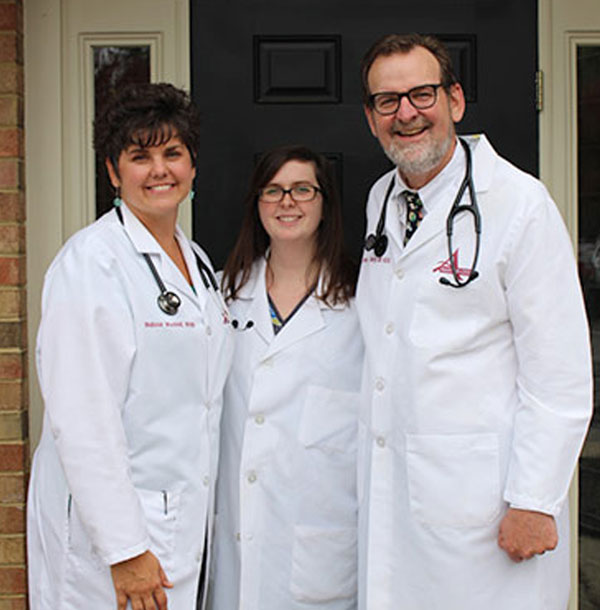Genital Herpes (HSV)
Genital herpes is a common disease caused by a virus. The virus is called the herpes simplex virus, or HSV. It is transmitted by sexual relations including oral and intercourse. It can affect both sexes and may involve the vagina, cervix thighs, buttocks, and penis. It causes painful blisters that break open and form sores in the genital area.
How does it occur?
You can become infected with the virus by contact with broken blisters or sores on the genitals, mouth, or rectal area of an infected person. The infection can be passed from person to person during intercourse and oral sex. You may spread it with your hands if the virus gets on your hands.
There are 2 types of the HSV virus, type 1 and 2. HSV-1 typically causes the common cold sores, which appear on the mouth, but through oral sex, can occur in the genital area. HSV-2 typically causes the genital outbreaks. Once you are infected, the virus stays in your body for the rest of your life. Usually the virus is inactive, which means it is staying in certain cells and not causing symptoms. However, the virus may become active and cause sores again. The sores may come back often. Outbreaks of sores may occur with physical stress, such as wearing tight clothing, having sex without enough lubrication, having other illnesses or pregnancy. Emotional stress or menstruation may also cause an outbreak. Most people with herpes have recurrent infections.
Herpes is very contagious when you have sores. It is also possible to infect others even when you do not have any blisters.

What are the symptoms?
People may have minor symptoms, mild enough to pass without concern. Most of the time, the herpes virus is inactive or “silent” and cause no symptoms. Other times, the symptoms may occur within 2 weeks after the virus first enters your body and may include:
- painful sores (blisters) on the genitals (for example, a man’s penis or the area around a woman’s vagina), thighs, or buttocks
- vaginal discharge
- pain when you urinate or have intercourse
- trouble urinating
- trouble urinating
- general discomfort, such as tiredness and muscle aches
- fever (usually only with the first outbreak of blisters)
- tender, enlarged lymph nodes in the groin
- The sores appear first as tiny clear blisters. Usually they occur in groups of several blisters, but sometimes there may be just a single blister. The blisters usually quickly lose their thin tops. Then they look like small (1/8 inch to 1/4 inch wide), pink or red shallow sores. The blisters may be painful and oozing. They may become covered with a yellowish dried crust.
How is it diagnosed?
You should be examined by your provider as soon as you have the first symptom. This will help make the diagnosis more accurate. Cells or liquid from one of the sores can be cultured in the lab for the virus. This needs to be done either when the blisters are intact or just after they have ruptured.
How is it treated?
Genital herpes cannot be cured. The virus will stay in your body. However, there are prescription medicines such as acyclovir, famciclovir, or valacyclovir to relieve the symptoms more quickly. Even though you are taking the medicine, the infection will still be very contagious as long as you have sores, but the medicine will shorten the amount of time you are contagious.
Pain medicine such as acetaminophen or ibuprofen can help relieve pain and fever. Sitting in a bathtub of warm water 2 or 3 times a day may also help soothe the pain. Using a cold pack will help alleviate the pain and slow down viral replication.
If a pregnant woman has an active herpes infection at the time her baby is born, she could pass the disease to her baby. If you are pregnant and have had herpes, tell Dr. Hardy or the Nurse Practitioner so steps can be taken to avoid infecting the baby at delivery. Typically, suppression therapy is used beginning at 36 weeks to help prevent an outbreak at delivery. If you have an active herpes infection when you go into labor, Dr. Hardy may suggest a cesarean delivery (C-section).
How long will the effects last?
The sores usually start to heal after about 5 days. They generally disappear in 1 to 3 weeks. Sometimes they may last for as long as 6 weeks, especially when a woman also has a bacterial or yeast infection of the vagina. The sores rarely leave scars.
About half of herpes-infected people have repeat outbreaks of sores. These recurrences tend to be milder than the first bout of herpes and the sores heal more quickly.
How can I take care of myself while I have an active infection?
When you have sores:
- Take all the medicine as prescribed.
- Wipe yourself from front to back after using the toilet.
- Wear loose clothing, preferably cotton, to allow circulation of air. It also helps avoid pressure on the skin, which may cause more blisters.
- Take aspirin, acetaminophen, or ibuprofen to reduce pain.
- Avoid sharing towels or clothing.
- Avoid using douches, perfumed soaps, sprays, feminine hygiene deodorants, or other chemicals in the genital area.
- Avoid a lot of sunlight and heat, which may cause more blisters.
- Avoid sexual contact with others.
- Use cold packs to help alleviate pain.
- Lukewarm baths with Aveeno (oatmeal soap or bath product) or a tablespoon of salt added can ease some of the discomfort caused by the blisters.
- To reduce the pain during urination, women may urinate in a shower, bath, or urinate through a tubular device, such as a toilet paper roll or plastic cup with the bottom cut out, or pour a cup of lukewarm water over the genitals while urinating.
- Although genital herpes itself is not usually a serious disease, having it can lead to depression and other emotional problems. Don’t let herpes lower your self-esteem. Recognize and avoid stress because stress can decrease your resistance to reinfection.
There are many herpes counseling groups that give support and help to herpes patients. You can learn more about Genital Herpes at the American College of Obstetricians and Gynegologists at https://www.acog.org/Patients/FAQs/Genital-Herpes
What can I do to help prevent recurrences of herpes infection?
You may have fewer recurrences if:
- You take all the medicine prescribed.
- Daily doses of acyclovir or another antiviral medicine may lessen the frequency of recurrent outbreaks of herpes sores and might prevent recurrences completely.
- Keep all follow-up visits and tests.
- You tell your sexual partner or partners about the infection so they can be checked and treated, if necessary.
- You avoid conditions that might cause the infection to recur, such as high stress or vaginal infections.
- Avoid smoking.
How can I help prevent infection with genital herpes?
- Practice safe sex. Always use latex or polyurethane condoms during any sexual contact because it is not possible always to know or predict when the virus can be shed or passed to someone else. This includes oral-genital and anal-genital sex. In addition, you are less likely to get a sexually transmitted disease if you have just one sexual partner who has no other partners.
- Ask your partner(s) if they have had herpes because herpes may be spread from areas not protected by condoms; for example, the groin, thigh, and abdomen. Avoid sexual contact if your partner has any sores.
- Avoid oral-genital and oral-anal sex with someone who has fever blisters (cold sores) in the mouth. Cold sores are caused by a related virus that can infect the genitals.
- Avoid stress where possible.
- If you are pregnant, tell Dr. Hardy or the Nurse Practitioner so precautions will be taken to prevent infection of the baby.

